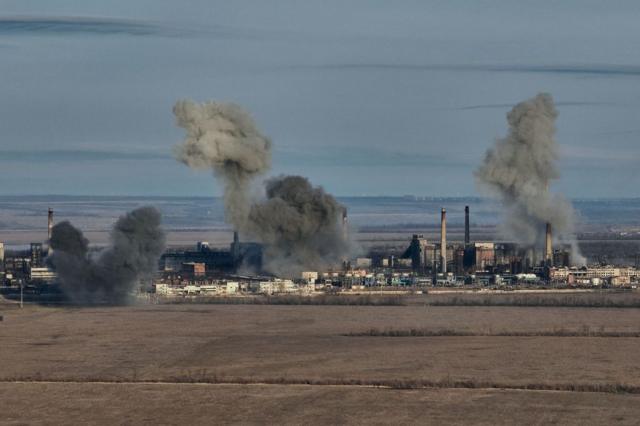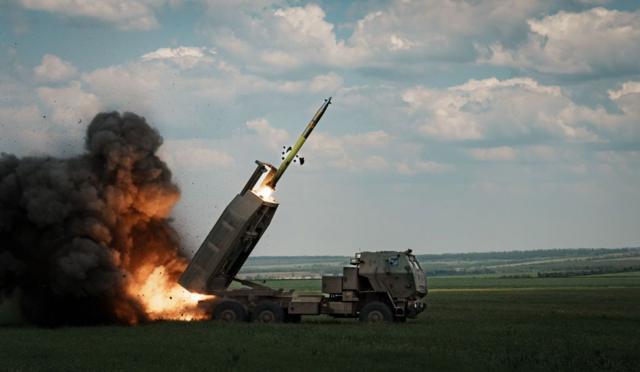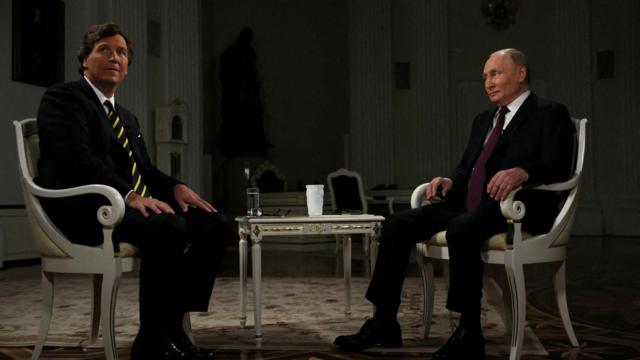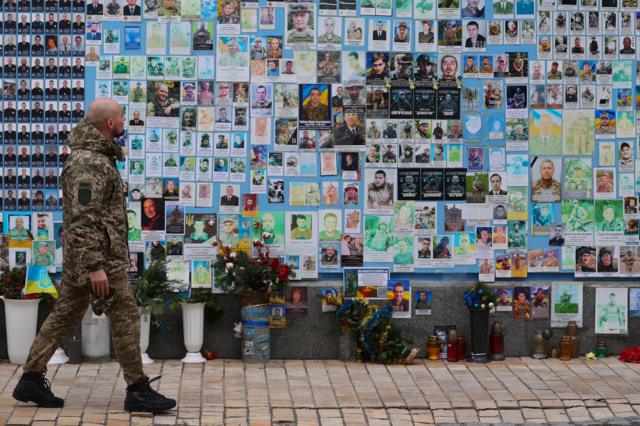Two years after the start of a full-scale war in Ukraine, there is no reason to believe that it will end soon.
Neither Ukraine, nor Russia, nor key allies on both sides see any reason for a peaceful settlement.
Kyiv is adamant that its internationally recognized borders must be restored and all occupied territories liberated. While Moscow continues to argue that Ukraine is not a full-fledged state, and Russian forces will press until they achieve their goals.
We tried to answer five key questions about what is happening now and how things may develop in the future.
Who wins?
Fierce battles took place throughout the winter, costing both sides many lives.
The front line stretched for a thousand kilometers, and its shape has changed little since the fall of 2022.
Within months of launching a full-scale invasion two years ago, Ukraine pushed Russian troops out of the north and from Kyiv. Later that year, it regained significant territories in the east and south.
But now Russian forces are entrenched, and the Ukrainians say they are running out of ammunition.

PHOTO AUTHOR, GETTY IMAGES Photo caption In mid-February, Ukrainian troops retreated from Avdiivka, for which fierce fighting had been going on since last October
Many talk about the impasse, for example, the recently dismissed commander-in-chief of the Armed Forces of Ukraine Valery Zaluzhny, as well as pro-Kremlin military bloggers.
In mid-February, Ukrainian troops retreated from Avdiyivka in the east, for which fierce fighting had been going on since last October.
Moscow hailed this as a major victory, as Avdiyivka is strategically located, potentially opening avenues for a deeper incursion.
In Kyiv, they declared that the withdrawal was aimed at saving the lives of the military, and did not hide that the enemy's forces were outnumbered and armed many times.
It was Russia's biggest gain since the capture of Bakhmut last May. But Avdiivka is only 20 km northwest of Donetsk, which has been occupied by Russia since 2014.
Such progress is far from the initial ambitions of Russia in February 2022, which were mentioned by military bloggers and repeated by state propaganda - to take Kyiv "in three days".
Currently, about 18% of Ukraine's territory remains under Russian occupation, along with Crimea, which was annexed in March 2014, and large parts of the Donetsk and Luhansk regions in the east, which Russia seized after that.
Is support for Ukraine fading?
Over the past two years, Ukraine's allies have sent it huge amounts of military, financial and humanitarian aid - almost $92 billion from European Union institutions and $73 billion from the United States as of January 2024, according to the Kiel Institute of World Economics.
Western-supplied tanks, air defense and long-range artillery significantly helped Ukraine.
But in recent months, the flow of aid has dwindled amid debate over how long allies can realistically support Ukraine.
In the US, a new $60 billion aid package has been blocked in Congress by internal political disputes.
There is also concern among Ukrainian supporters that US support will be significantly reduced if Donald Trump returns to the White House in November's presidential election.
The EU approved a $54 billion aid package in February after lengthy discussions and negotiations, primarily with Hungary, whose Prime Minister Viktor Orban is a Putin ally and opposes support for Ukraine.
In addition, the EU will be able to deliver only about half of the one million artillery shells it promised to Kyiv by the end of March 2024.

PHOTO AUTHOR, GETTY IMAGES Photo caption, The United States provided the most military aid to Ukraine
At the same time, Russia's supporters include primarily Belarus, whose territory and airspace Moscow used to attack Ukraine.
The US and the EU say Iran is supplying Russia with drones, although Iran says it only provided Russia with a small number of drones before the war began.
UAVs have become a weapon used effectively by both sides. They are able to evade anti-aircraft defenses.
The other day, the Reuters agency, citing six anonymous sources, reported that Iran has also begun supplying Russia with a large number of powerful ballistic missiles.
Sanctions have not worked as well as Western countries had hoped, and Russia still manages to sell its oil and buy spare parts and components for its military industry.
China is not believed to be providing arms to either side. Beijing has generally taken a cautious diplomatic line on this war, not condemning the Russian invasion but also not supporting Moscow with arms. However, both China and India continue to buy Russian oil.
Both Russia and Ukraine have also made great efforts to win over the countries of the Global South, making numerous diplomatic visits to Africa and Latin America.
Have Russia's goals changed?
Vladimir Putin, it seems, still hasn't given up on taking over all of Ukraine.
In his recent interview with the American presenter Tucker Carlson, Putin - without any objections from the interlocutor - again laid out his distorted vision of history and the war in Ukraine.
He has been claiming for a long time, without providing any evidence, that the civilian population in Ukraine, primarily in the Donbass, needs Russia's protection.

PHOTO AUTHOR, SPUTNIK / REUTERS Photo caption During his long interview with Tucker Carlson, Putin also complained about the expansion of NATO's influence in the east
Before the war, he wrote a long essay in which he denied the existence of Ukraine as a sovereign state, declaring that Russians and Ukrainians are "one nation."
In December 2023, he declared that the goals of the "special military operation," as Russia calls its invasion of Ukraine, had not changed, and they still included the "denazification" of Ukraine. This idea is based on unsubstantiated claims about the influence of the far-right on the Ukrainian government.
He also says he wants a "demilitarized" and "neutral" Ukraine, and continues to oppose the expansion of NATO's influence to the east.
As an independent state, Ukraine has never joined any military alliances. Her political goals included joining the European Union, and she was negotiating a closer alliance with NATO - both prospects now seem closer than at the start of the war.
These goals were aimed at strengthening the statehood of Ukraine and protecting it from being involved in any geopolitical projects of restoring the Soviet Union in one form or another.
How will the war end?
Given that neither side is going to surrender, and Putin looks set to remain in power, analysts' forecasts are leaning toward a protracted war.
Globsec, an analytical center for security issues, after interviewing dozens of experts, assessed the probability of various scenarios for the end of the war. A war of attrition, stretching beyond 2025, with heavy casualties on both sides, and Ukraine continuing to depend on arms supplies from allies, is most likely.
The second possible development is the escalation of conflicts in other parts of the world, such as the Middle East, China-Taiwan and the Balkans, where Russia will try to inflame tensions.

PHOTO EPA Image caption Experts say a protracted war of attrition with high casualties is most likely
The researchers named two more potential scenarios with equal probability. The first is that Ukraine will have some military progress, but will not reach an agreement to end the war. The second is that the support of Ukraine's allies will decrease, and they will push Kyiv to negotiate.
However, uncertainty remains both about the potential impact of the US presidential election and how other wars, primarily Israel's conflict with Hamas, will affect the priorities and loyalties of Ukrainian and Russian supporters.
Can the war spread?
In mid-February, Volodymyr Zelenskyi warned that keeping the country in an "artificial shortage" of weapons plays into Russia's hands.
He told a security conference in Munich that Putin would make the next few years "disastrous" for many other countries unless the Western world came together to fight him back.
The Rusi think tank says Russia has successfully transitioned its economy and defense industry to expanded military production and is ready for a protracted war. Analysts say that Europe is not keeping up with this, the Minister of Foreign Affairs of Poland also stated this.
European countries, along with warnings from Germany's foreign minister and Estonia's intelligence services, have recently expressed fears that Russia could attack a NATO country within the next decade.
This prompted NATO and the EU to intensify future planning both in terms of military potential and the readiness of society to live in a completely different world.

